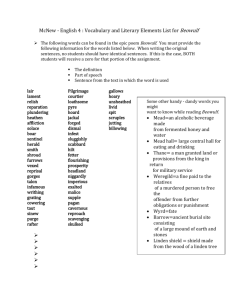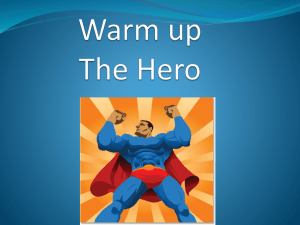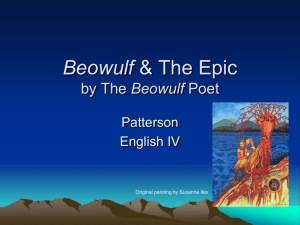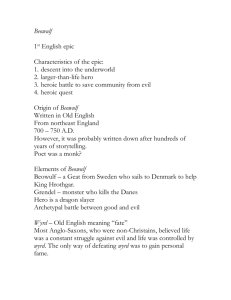Beowulf. Like all early oral poetry, it had as many authors as singers
advertisement
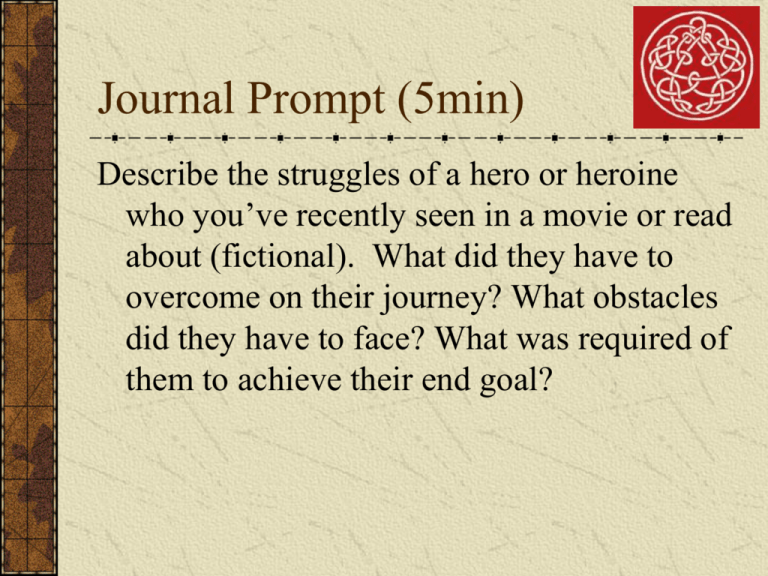
Journal Prompt (5min) Describe the struggles of a hero or heroine who you’ve recently seen in a movie or read about (fictional). What did they have to overcome on their journey? What obstacles did they have to face? What was required of them to achieve their end goal? Please take notes Beowulf Is a long heroic poem considered the supreme achievement of Anglo-Saxon poetry because of its length (3,182 lines) and sustained high quality. Why is Beowulf important? Beowulf is both the first English literary masterpiece and one of the earliest European epics written in the vernacular, or native language, instead of literary Latin. The story survives in one fragile manuscript copied by two scribes near the end of the 10th or the first quarter of the 11th century (roughly 1000 AD). While the poem is Old English, it focuses on the Geats (a people who lived in the southern part of Sweden) and Danes. No one knows who “wrote” Beowulf. Like all early oral poetry, it had as many authors as singers who performed it. It is from this poem that we derive many of the details for our reconstructions of AngloSaxon social life. Scops (pronounced "shops") were both composers and storytellers who traveled from court to court — the entertainers of Anglo-Saxon times. Scops were expected to know a broad repertoire of tales and no doubt be able to compose tales in tribute to the patrons who financed them. (A Modern Scop:Benjamin Bagby) https://www.youtube.com/watch?v=Y13cES7MMd8 An important aspect of Beowulf is the way in which it is told/written. •The scop uses kennings, alliteration, caesuras, and foreshadowing in telling his story. •He also takes great care in describing Beowulf’s appearance as he readies for battle, as well as other parts of the story. •These create a strong (and difficult) voice. Kennings are a special form of compounding Words that are metaphoric in meaning. banhus (ban + hus), literally "bone-house," refers to the human body; hronrad (hron + rad), literally "whale's road," refers to the sea; Rodores candel, literally "sky's candle," refers to the sun Alliteration DefinitionA figure of speech in which consonants, especially at the beginning of words, or stressed syllables, are repeated… •In [Old English] poetry, alliteration was a continual and essential part of the metrical scheme . •"Five miles meandering in motion." Foreshadowing The action of Beowulf is not straightforward. The narrator foreshadows actions that will occur later, talking about events that are yet to come. Characters talk about things that have already happened in the poem and recall incidents and characters outside the poem's main narrative. Caesura Old English poetry has a strong rhythmic quality, with each line punctuated with a pause in the middle called a caesura. Out from the marsh, from the foot of misty Hills and bogs, bearing God’s hatred, Grendel came, hoping to kill Themes & Look for the struggles of … Conflict •good against evil •strength against weakness •light against dark Epic vs. Narrative The first factor that distinguishes epics from other forms of narrative poetry is scale: -epic poems tend to be too long to be read or performed in a single sitting. Second distinguishing factor is style: Epic poems are written in what might be termed high style, avoiding popular metres and verse patterns. Formal language versus colloquial. Third distinguishing factor Epic poems always deal with persons and events that are considered to be historically real by the poet and their audience, essentially, the tale of the tribe. The fourth distinguishing factor the epic hero cycle. Key Elements in the Hero’s Journey • The plot is complicated by supernatural beings or events. • The actions of the hero often determine the fate of a nation or group of people • The poem reflects values such as courage and honor. The hero takes a journey to foreign lands. 3 phases of the hero journey: •Separation – a break away from local social order, the beginning of a quest. •Initiation – a long deep retreat inward with a series of chaotic encounters which provide new insight. •Return – reintegration into society, coming back as as a more evolved person. The general points of the cycle include: •a test (to test worthiness to complete said quest) •a main antagonist, often supernatural •a magical/unreal world, unable to be visited by a normal human, that the hero visits (e.g. the underworld or the world of the gods) •a resurrection (either from being dead or from a dead-like state of mind, or a hero who was thought to be dead who was rediscovered) From the story described in your prompt explain how the hero’s journey fits the three phases – be sure to give examples.

